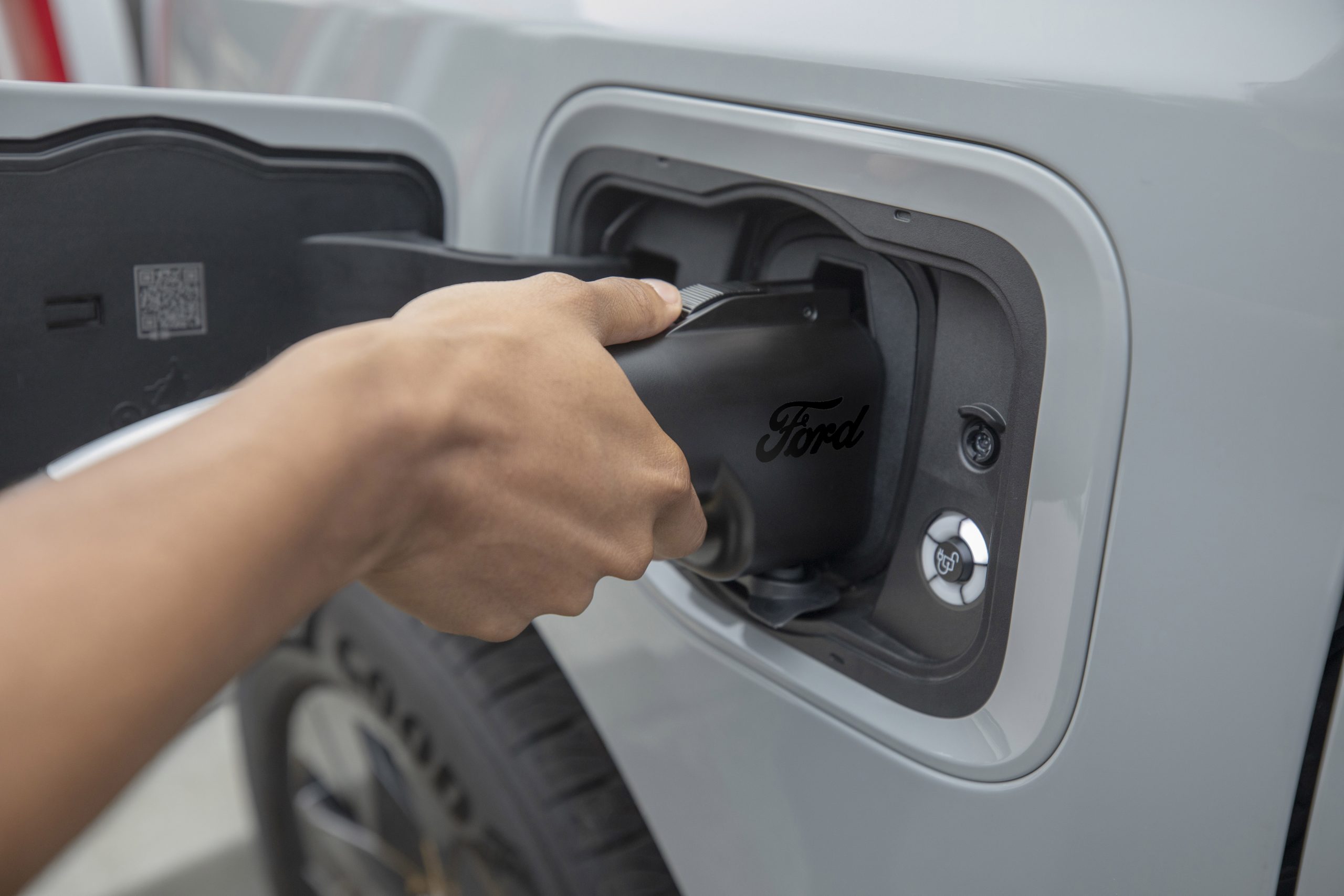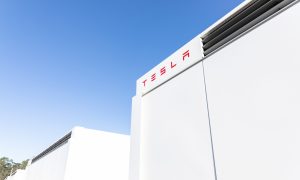As expected, the transition team for President-elect Donald Trump is now reportedly looking to slash support for electric vehicle (EV) and charging programs set up by the Biden administration, along with lodging global tariffs and pushing to ease regulations on fossil-fuel emissions.
The Trump transition team is now looking at plans to ease regulations on the fossil fuel industry and to cut many EV programs, including the $7,500 EV tax credit, along with lodging tariffs on battery material imports worldwide, according to a document seen by Reuters this week.
As part of efforts to bolster the domestic supply chain for battery materials, many of which are produced in China and are heavily subsidized in the U.S., the transition team has recommended imposing tariffs on all battery materials around the world, before negotiating individual exemptions with allies, as the document shows.
“When he takes office, President Trump will support the auto industry, allowing space for both gas-powered cars and electric vehicles,” said Karoline Leavitt, spokesperson for the Trump transition team, in a statement.
RELATED: U.S. Supreme Court to hear challenge on California emission rule waiver
Although Trump campaigned on promises to end the $7,500 federal EV credit and official plans to kill the subsidy were reported last month, the transition team has also called for rolling back the $7.5 billion plan passed under Biden to help aid the buildout of charging stations for EVs.
Instead, the team has said that it would shift this and other funding currently going toward making EVs more affordable toward national defense efforts, including the initiative to secure battery supplies without relying on China. The document notes that these efforts would focus on shifting money toward battery material production, as well as the “national defense supply chain and critical infrastructure.”
The document suggested that the team utilize Section 232 tariffs, which are intended to limit the import of any items related to potential national security threats. Biden recently increased tariffs on several imports related to charging technology and critical minerals for EV batteries, including graphite, “permanent magnets” used in EV motors and in military applications, and lithium-ion batteries, among others, though the tariffs were issued on economic grounds, rather than on those in national security.
The transition team is also looking to waive environmental reviews to accelerate “federally funded EV infrastructure projects,” such as those in battery production and recycling, charging deployment, and manufacturing of critical minerals. Other proposals detailed in the document include:
- Ditching federal requirements for electrifying government fleets, including Biden’s policy to mandate all federal purchases by zero-emission vehicles by the end of 2027
- Using the Export-Import Bank of the U.S. to provide financial support for U.S. batteries for EVs
- Utilizing tariffs as a “negotiating tool” to encourage other markets to consider U.S. auto exports including both gas cars and EVs
- Ending restrictions on exports of EV battery technology to countries deemed adversaries
- Ending programs for the Department of Defense attempting to buy or develop electric military vehicle options
How will ending the $7,500 EV tax credit affect Tesla? Musk calls it a benefit
While many have said that ditching the $7,500 tax credit and other policies intended to help spur on the adoption of EVs could hurt Tesla, CEO Elon Musk and others have argued that it may only benefit the company by harming other automakers even more. Wedbush analyst Dan Ives said last month that the change would only “enable Tesla to further fend off competition from Detroit,” given its already decisive advantage in EV scale.
In his latest statement regarding EV subsidies, made on X last month, Musk called for the U.S. to “end all government subsidies, including those for EVs, oil and gas.”
Musk also campaigned with Donald Trump during the election and created the political action committee (PAC), dubbed America PAC, to support his candidacy financially. He has since gained a position in what the team has called the Department of Government Efficiency, and he’s expected to play a major role in the upcoming administration.
In a report last week, it was said that the Trump transition team is also considering getting rid of a mandatory reporting measure for automated driving systems, as part of a larger effort to remove regulations and push self-driving vehicle development forward more quickly. An additional report from last month also suggests that Trump is already looking to create federal rules surrounding the rollout of autonomous vehicles, expected to accelerate the deployment of commercial robotaxis and other self-driving technologies.
What are your thoughts? Let me know at zach@teslarati.com, find me on X at @zacharyvisconti, or send us tips at tips@teslarati.com.
Analysts weigh in on Trump presidency’s effects to U.S. auto sector
Need accessories for your Tesla? Check out the Teslarati Marketplace:
News
Tesla Robotaxi has already surpassed Waymo in this key metric
Tesla Robotaxi has already overtaken Waymo in Austin in one key metric, but there’s still more work to do.

Tesla Robotaxi has already surpassed Waymo in one extremely important key metric: size of service area.
Tesla just expanded its service area in Austin on Monday morning, pushing the boundaries of its Robotaxi fleet in an interesting fashion with new capabilities to the north. Yes, we know what it looks like:
🚨 Tesla’s new Robotaxi geofence is…
Finish the sentence 🥸 pic.twitter.com/3bjhMqsRm5
— TESLARATI (@Teslarati) July 14, 2025
The expansion doubled Tesla Robotaxi’s potential travel locations, which now include the University of Texas at Austin, a school with over 53,000 students.
The doubling of the service area by Tesla has already made its travel area larger than Waymo’s, which launched driverless rides in October 2024. It became available to the public in March 2025.
According to Grok, the AI agent on X, Tesla Robotaxi’s current service area spans 42 square miles, which is five square miles larger than Waymo’s service area of 37 square miles.
Tesla Robotaxi (red) vs. Waymo geofence in Austin.
Much can be said about the shape… but the Robotaxi area is now ~3.9 mi² (10 km²) larger than Waymo’s!! pic.twitter.com/dVfh2ODxJC
— Robin (@xdNiBoR) July 14, 2025
The service area is one of the most important metrics in determining how much progress a self-driving ride-hailing service is making. Safety is the priority of any company operating a ride-hailing network, especially ones that are making it a point to use autonomy to deploy it.
However, these companies are essentially racing for a larger piece of the city or cities they are in. Waymo has expanded to several different regions around the United States, including Arizona and Los Angeles.
Tesla is attempting to do the same in the coming months as it has already filed paperwork in both California and Arizona to deploy its Robotaxi fleet in states across the U.S.
As the platform continues to show more prowess and accuracy in its operation, Tesla will begin to expand to new areas, eventually aiming for a global rollout of its self-driving service.
News
Tesla Megapacks arrive for massive battery replacing coal plant
Tesla Megapacks have started arriving on-site to the Stanwell Battery Project, just as Queensland prepares to wind down the Stanwell coal plant.
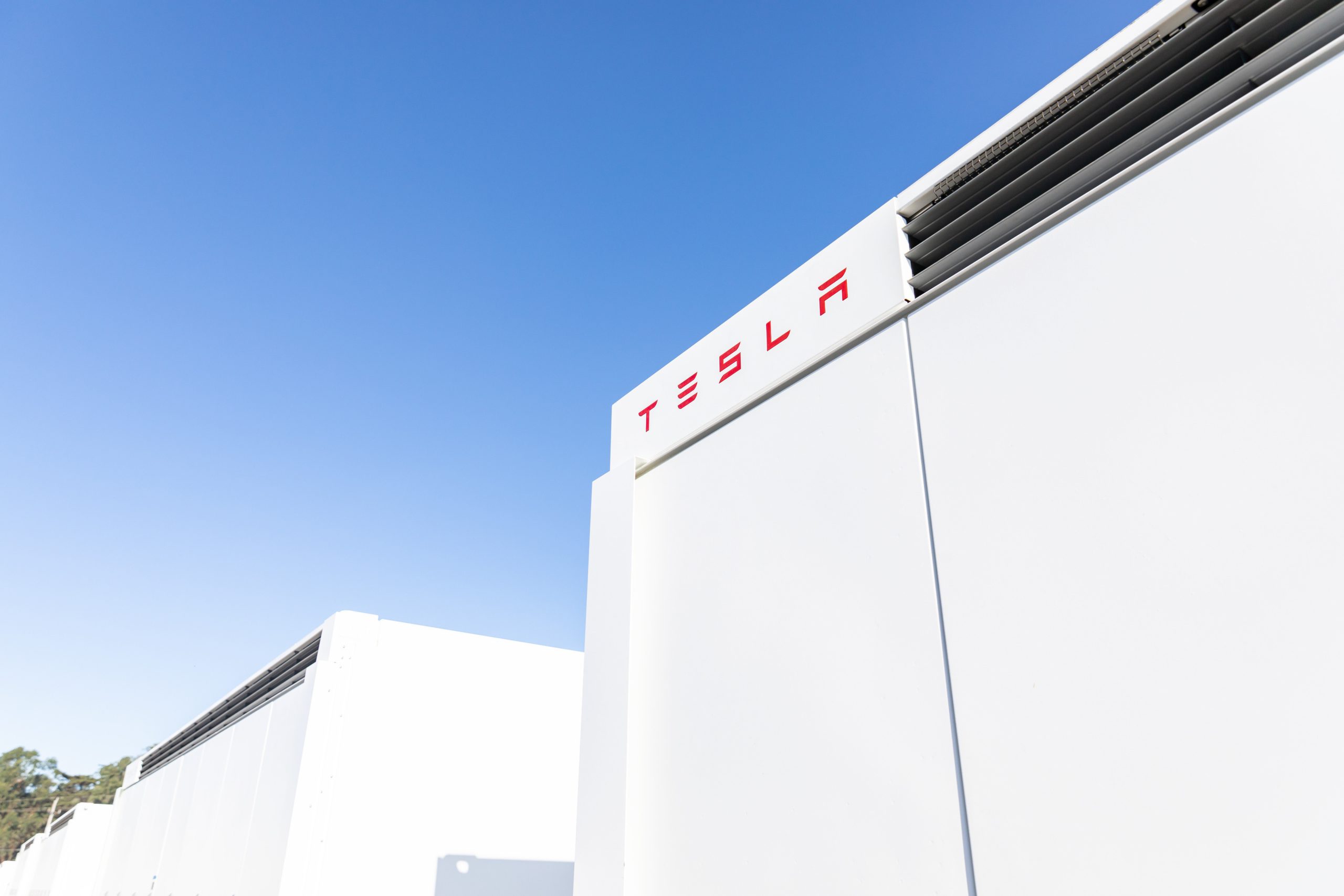
The first of over 300 Tesla Megapacks have arrived to the site of a massive battery energy storage system (BESS) being built in Australia, dubbed the Stanwell Battery Project after a coal plant it’s set to replace.
In a press release last week, the Stanwell Battery Project announced that the first Tesla Megapack 2XL units had arrived to the site, which is located outside of Rockhampton in Queensland, Australia. The project will eventually feature 324 Megapack units, set to arrive in the coming months, in order to support the 300MW/1,200MWh battery project.
“The Stanwell Battery is part of the diversification of our portfolio, to include cleaner and more flexible energy solutions,” said Angie Zahra, Stanwell Central Generation General Manager. “It is just one part of the 800 MW of battery energy storage capacity we have in our pipeline.
“Capable of discharging 300 MW of energy for up to four hours (1,200 MWh), our mega battery will be one of the largest in Queensland.”
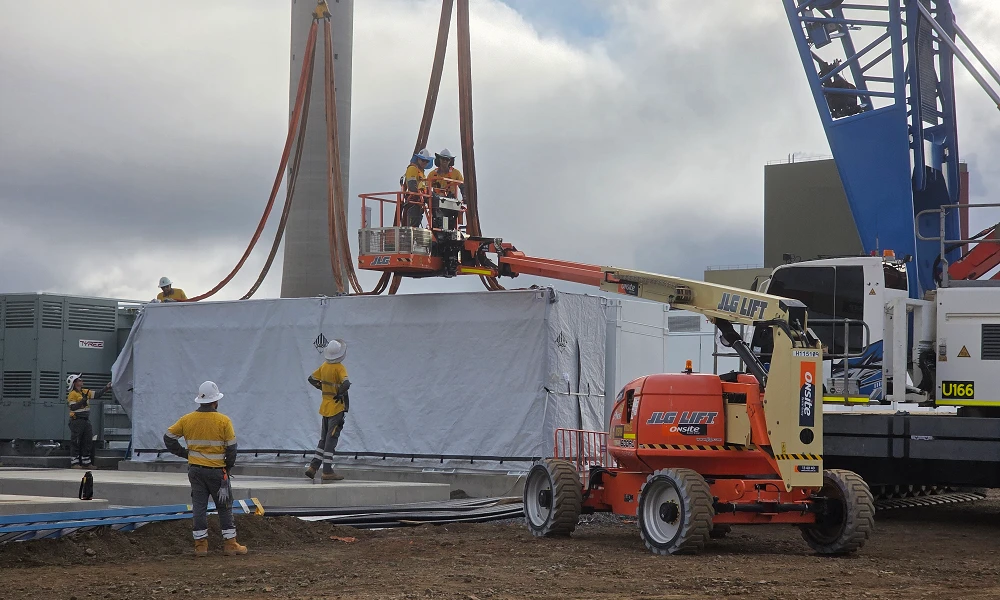
Credit: Stanwell
Did you know Tesla’s Lathrop facility churns out a Megapack every 68 minutes? That’s enough energy to power 3,600 homes for an hour per unit! ⚡️ pic.twitter.com/bG6fpHkB9O
— TESLARATI (@Teslarati) June 11, 2025
READ MORE ON TESLA MEGAPACKS: Tesla Lathrop Megafactory celebrates massive Megapack battery milestone
The state is working with government-owned company Yurika to facilitate construction, and the process is expected to create roughly 80 jobs. The project is expected to come fully online in May 2027, with initial commissioning of the Megapacks aiming for November 2025.
The Stanwell Battery is set to replace the nearby Stanwell coal generation plant, which the government is planning to wind down starting in 2026 as part of efforts to reach an 80 percent renewable energy generation ratio by 2035. Meanwhile, the government is also set to begin winding down the Tarong and Callide coal plants, while several other Megapack projects are being built or coming online. o ya
Tesla currently has two Megapack production facilities, located in Lathrop, California, in the U.S. and another that came online earlier this year in Shanghai, China. The Shanghai Megafactory shipped its first units to Australia in March, while both factories are expected to be capable of producing 10,000 Megapack units per year upon reaching volume production.
News
The Tesla Diner is basically finished—here’s what it looks like
The company first broke ground on the Diner, Drive-in, and Supercharger location in September 2023. Now, it has served one of its first internal customers.

Tesla has finally completed the construction of its highly anticipated Diner, Drive-in, and Supercharger in Los Angeles, and recent photos of the interior’s “retro-futuristic” style are making their way around the internet.
X user Brad Goldberg shared photos from the Tesla Diner site last Tuesday, depicting some of the Supercharger stalls, indoor and outdoor seating areas, multiple neon lights, and even an Optimus robot. Goldberg also noted that there had been a “flurry of activity on site” while he was snapping the photos last week, suggesting that the restaurant location could be getting close to opening.
The Tesla Diner also served one of its first internal customers in the past few days, as Elon Musk posted on X on early Monday morning that he had just finished up eating a meal at the site:
I just had dinner at the retro-futuristic Tesla diner and Supercharger.
Team did great work making it one of the coolest spots in LA!
The photos also show that the site is pretty much done, with some of them even showing vehicles charging at the charging stalls.
You can see some of the latest photos of the Tesla Diner below.
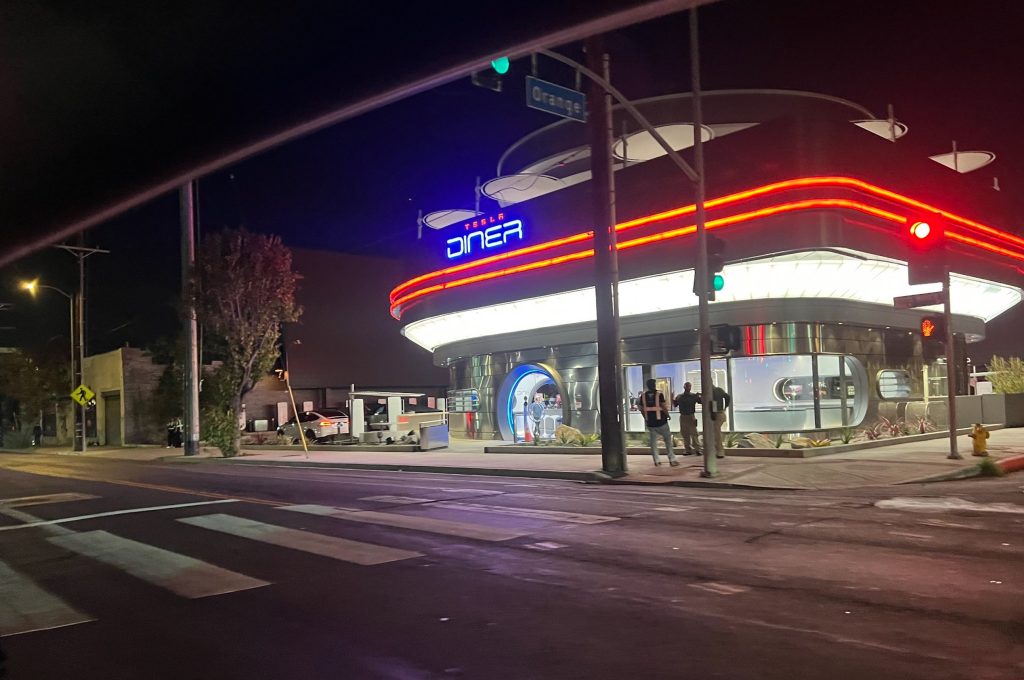
Credit: BradGoldbergMD | X
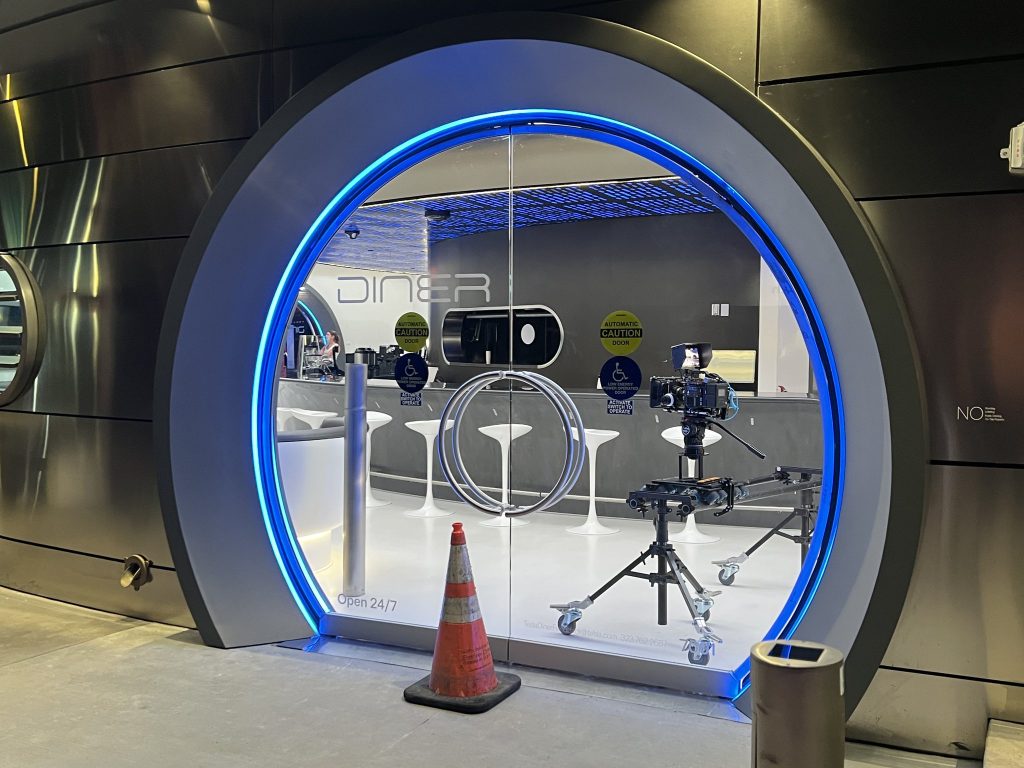
Credit: BradGoldbergMD | X
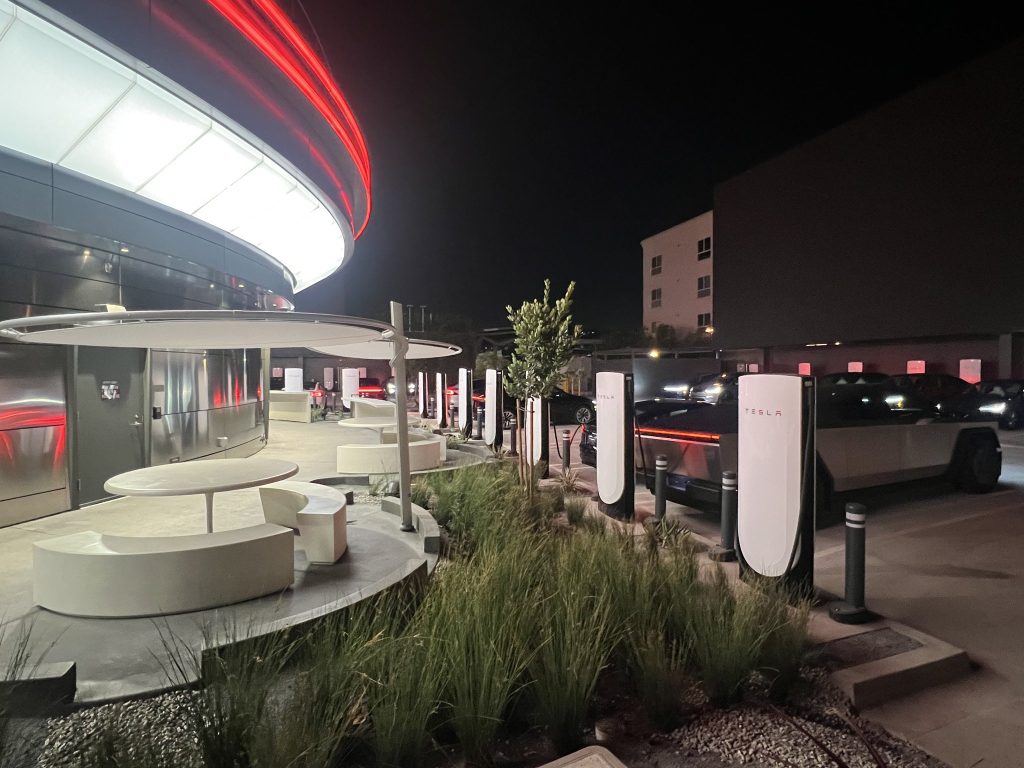
Credit: BradGoldbergMD | X
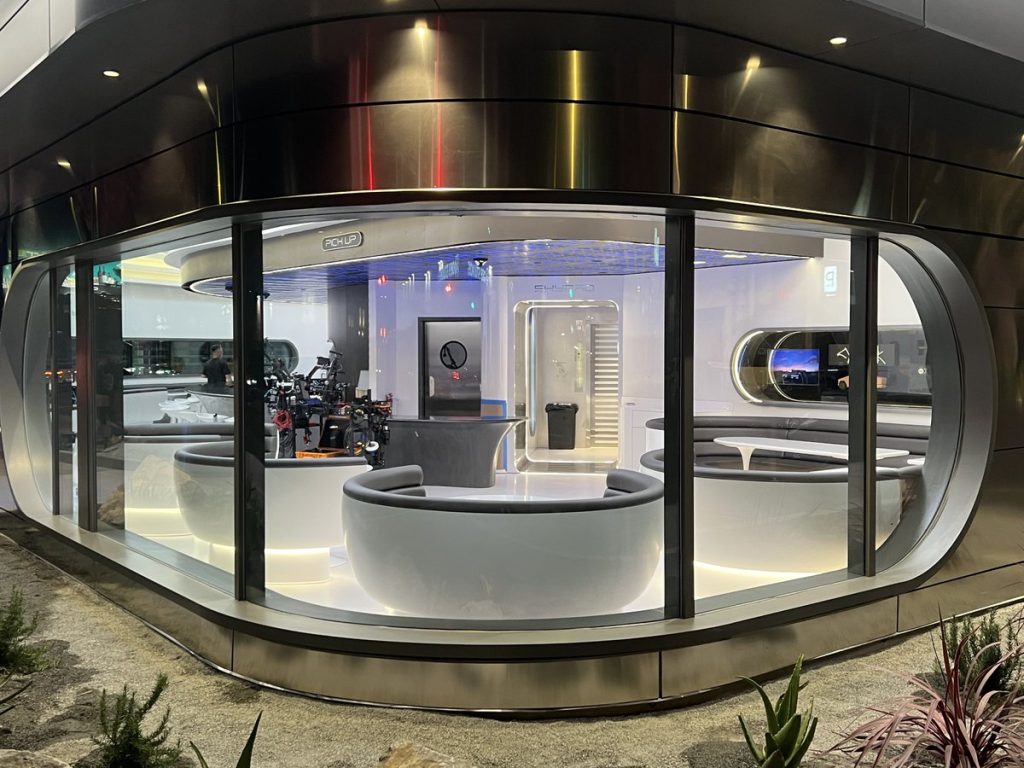
Credit: BradGoldbergMD | X
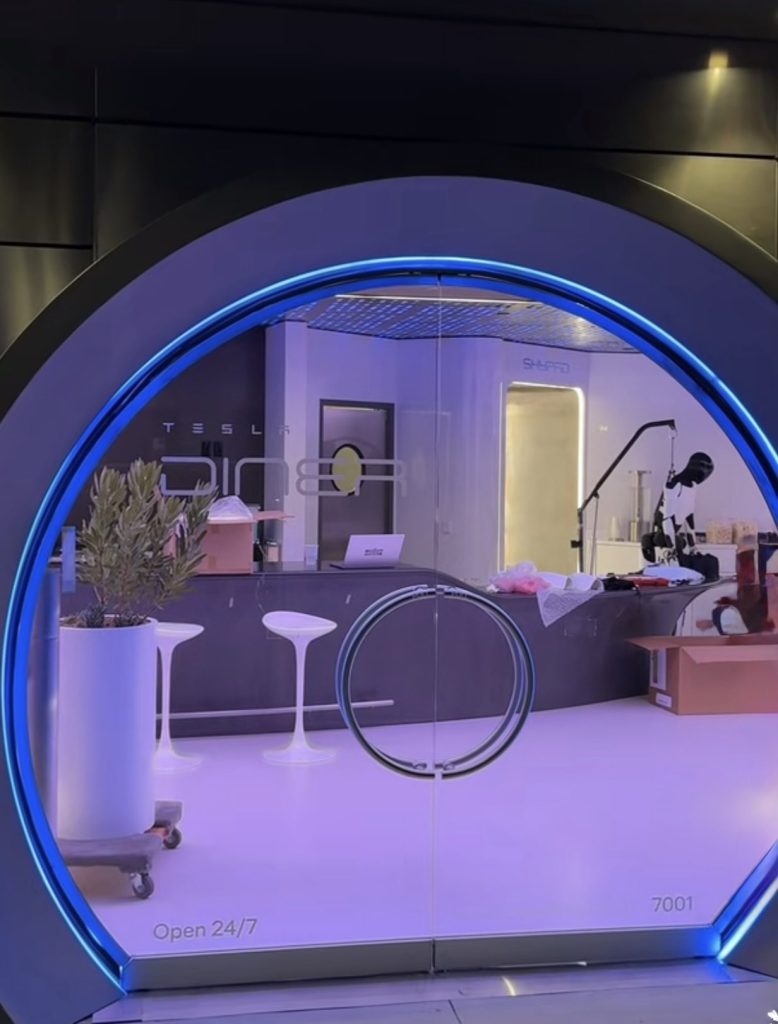
Credit: TeslaKing420 | X
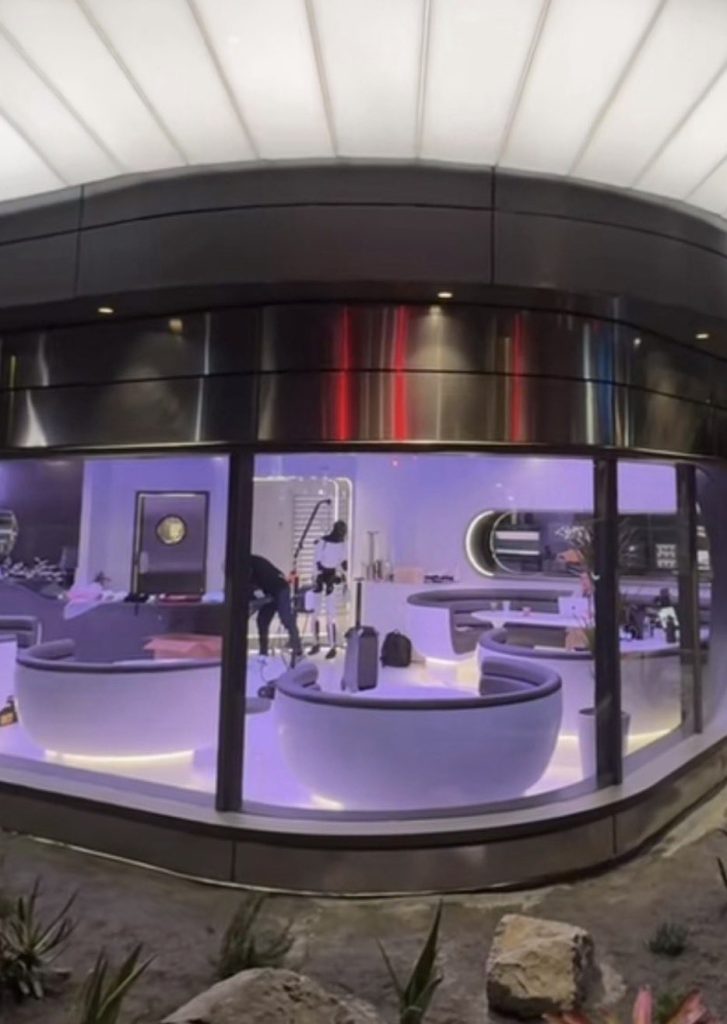
Credit: TeslaKing420 | X
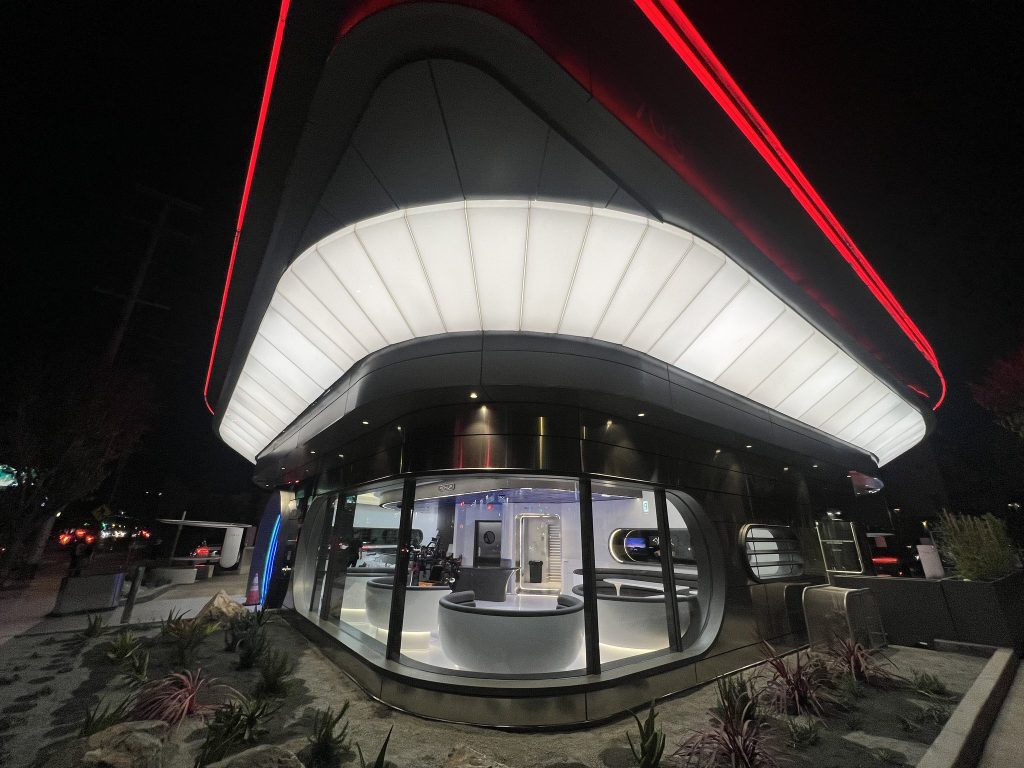
Credit: Brad Goldberg (via Sawyer Merritt on X)
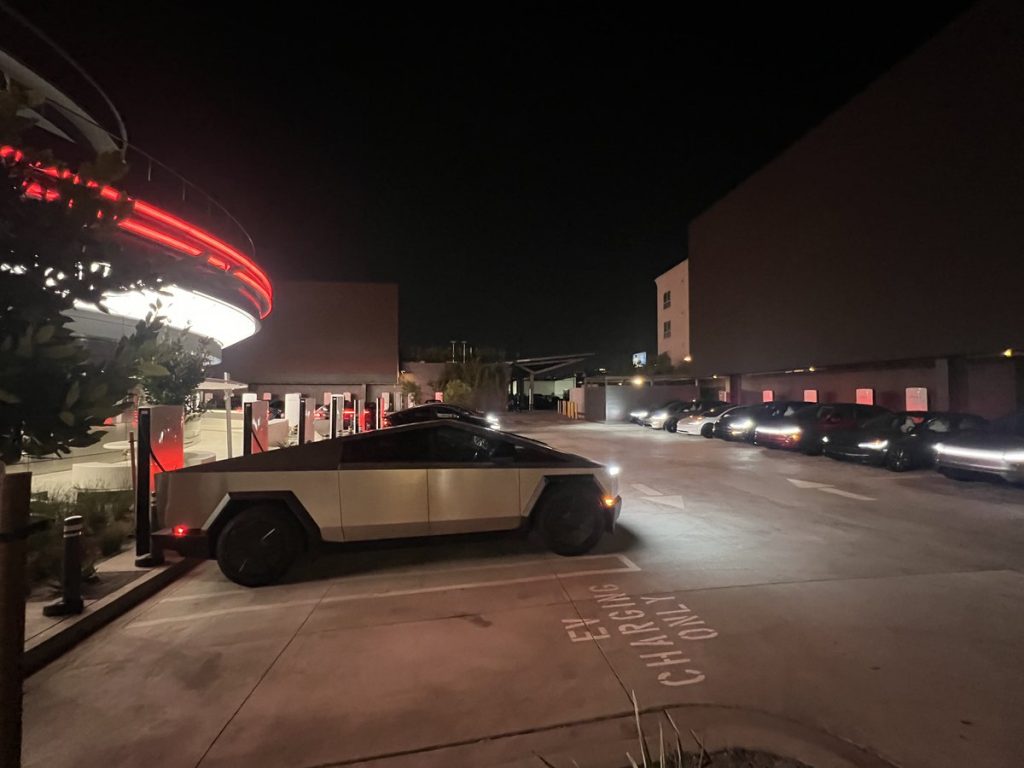
Credit: Brad Goldberg (via Sawyer Merritt on X)
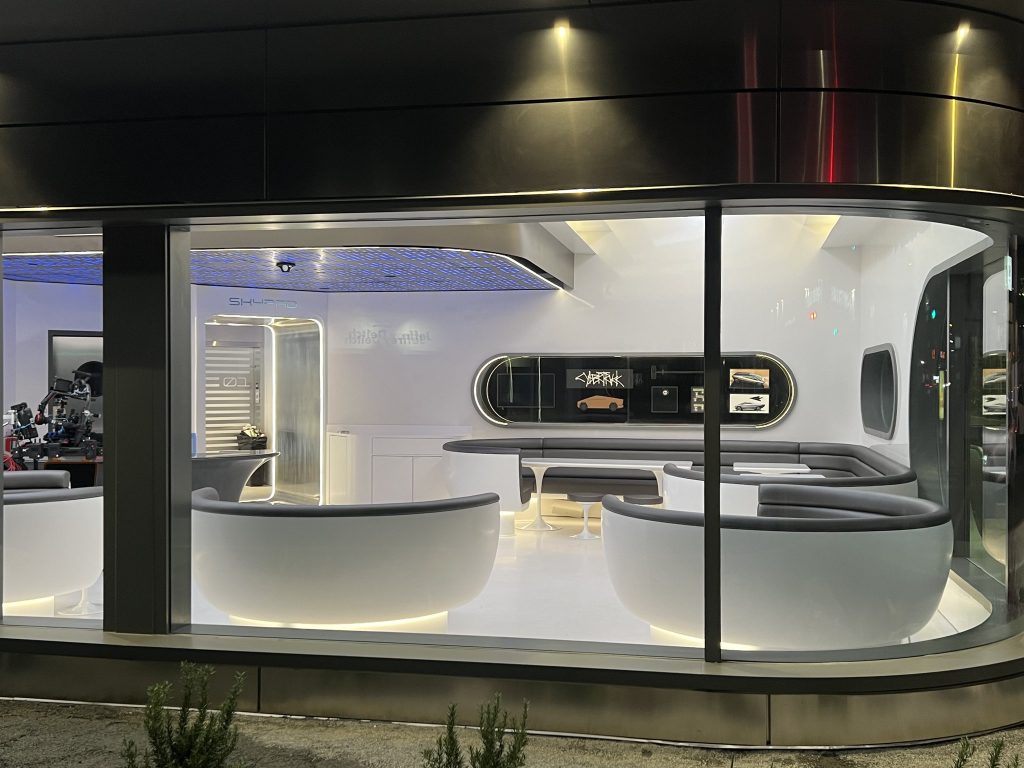
Credit: Brad Goldberg (via Sawyer Merritt on X)
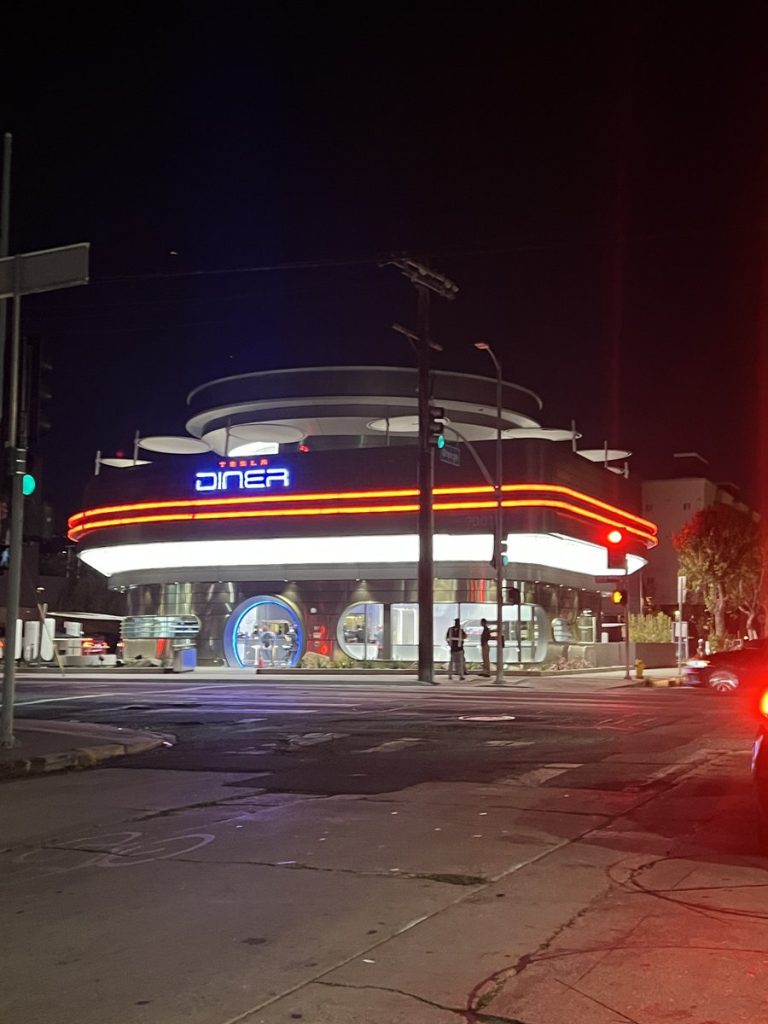
Credit: Brad Goldberg (via Sawyer Merritt on X)
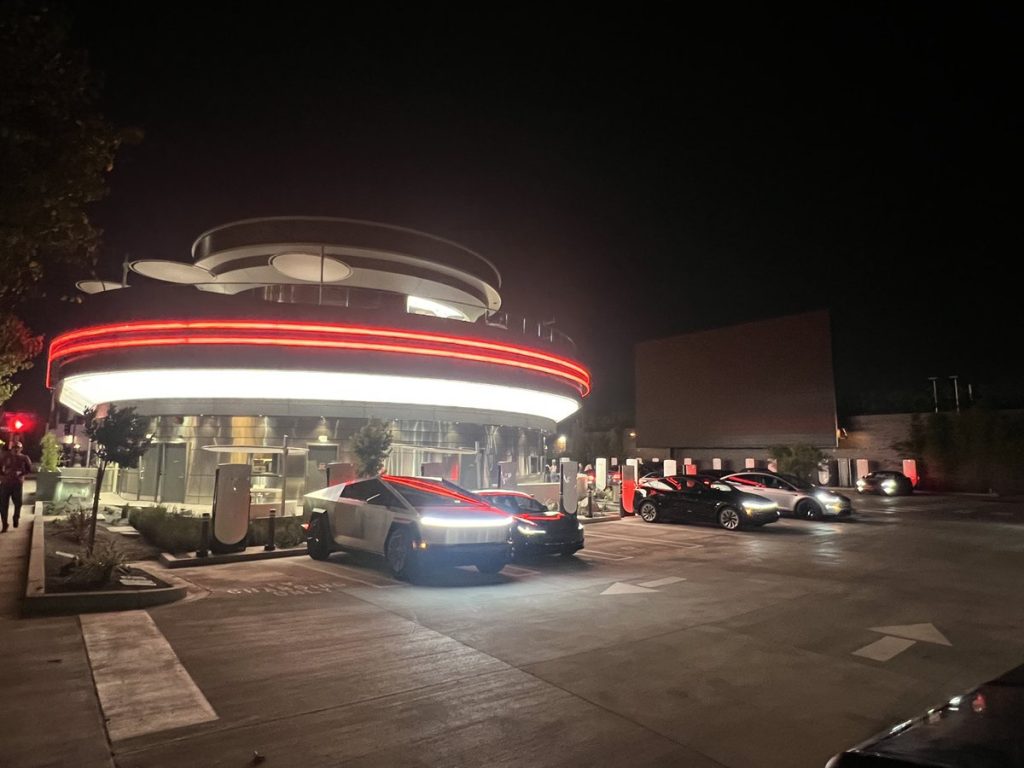
Credit: Brad Goldberg (via Sawyer Merritt on X)
READ MORE ON TESLA’S LA DINER: Tesla readies Drive-In Diner Supercharger for launch with app inclusion
When will the Tesla Diner open to external customers?
While it’s still not open to external customers yet, the news again suggests that the company could be close to an official opening date. Tesla first broke ground on the Diner in September 2023, after receiving a wave of building permit approvals throughout that year. Teslarati also covered much of the construction progress throughout last year, including when crews installed the first and second drive-in screens.
Located at 7001 West Santa Monica Boulevard, the idea was first discussed in 2018 by Musk and a few others on Twitter, featuring 1950s rock and roll, waiters on roller skates, and drive-in movie theater screens playing clips from some of history’s best movies. Notably, the photos of the front doors also show that the site will be open 24 hours a day, 7 days a week, whenever it does end up opening.
Tesla’s progress on Supercharger with diner, drive-in seen in aerial footage
-

 Elon Musk2 weeks ago
Elon Musk2 weeks agoTesla investors will be shocked by Jim Cramer’s latest assessment
-

 News2 days ago
News2 days agoTesla debuts hands-free Grok AI with update 2025.26: What you need to know
-

 Elon Musk4 days ago
Elon Musk4 days agoxAI launches Grok 4 with new $300/month SuperGrok Heavy subscription
-

 Elon Musk6 days ago
Elon Musk6 days agoElon Musk confirms Grok 4 launch on July 9 with livestream event
-

 News1 week ago
News1 week agoTesla Model 3 ranks as the safest new car in Europe for 2025, per Euro NCAP tests
-

 Elon Musk2 weeks ago
Elon Musk2 weeks agoxAI’s Memphis data center receives air permit despite community criticism
-

 News4 days ago
News4 days agoTesla begins Robotaxi certification push in Arizona: report
-

 Elon Musk2 weeks ago
Elon Musk2 weeks agoTesla scrambles after Musk sidekick exit, CEO takes over sales

